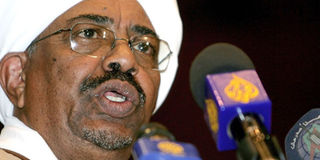Sudan President adviser criticises Obama’s warning of bloodshed

AFP | NATION
Sudanese President Omar al-Bashir
DOHA, Sunday
An adviser to Sudan’s president yesterday criticised US President Barack Obama for warning of possible bloodshed if a referendum on independence for south Sudan does not take place as planned in January.
“Obama receives reports from entities who do not know what is happening in Sudan,” Mr Mustapha Osman Ismail, adviser to President Omar al-Bashir, told a news conference in Doha.
“This is not the first time he speaks as such of Sudan, and it will not be the last. He makes those remarks based on what he hears from pressure groups.”
On September 24, President Obama and UN chief Ban Ki-moon led international warnings that the planned January 9 votes must be held on time and peacefully.
“At this moment, the fate of millions of people hangs in the balance,” Mr Obama told a special UN meeting.
“What happens in Sudan in the days ahead may decide whether people who have endured too much war, move towards peace or slip backwards to bloodshed,” he added.
Mr Ismail also criticised Washington’s stance on Sudanese unity.
“The United States was initially saying it wants Sudan to remain united, then it moved a little to say that what it wants whatever the southerners accept, and today it raises its voice saying that separation will be inevitable,” he said.
“This shows that there are US pressure lobbies linked to Israel talking and pushing things in this direction.”
South Sudan is scheduled to vote on January 9 on whether to become independent or remain part of a united Sudan, with many believing it will opt to split Africa’s largest nation in two.
Mr Ismail ruled out using force to defend Sudanese unity.
“The Sudanese army has been withdrawn completely from the south. We do not allow any thought implying that we intend to use military force,” he said.
But he warned of possible conflict in oil-rich Abyei, a flashpoint region straddling both sides that is also scheduled to vote on January 9 to decide whether to remain in the north or join the south.
“This matter is dangerous because it is based on a dialogue between two major tribes and societies — Misseriya and Ngok Dinka — and any agreement or concession without the consent of both sides will lead to a war,” he said. Misseriya Arabs are thought to favour remaining in a united Sudan and Ngok Dinka are seen as supporting joining an independent south.
Fears are growing of a renewed conflict in the run-up to the referendum.
President Omar al-Bashir told parliament this week he would “not accept” an alternative to unity, although he was committed to a 2005 peace treaty that ended a 22-year war with the south and gave it the right to hold a vote on independence.
Foreign Minister Ali Karti later said Khartoum would respect the outcome of the referendum and a senior official with President Bashir’s National Congress Party (NCP), Rabie Abdulatti, told AFP that Bashir’s comment was not a “threat.”
Bashir’s speech “should not be interpreted as a threat ... he proposed incentives to the southerners to choose unity,” he said. Bashir’s government insists it does not want to obstruct the referendum.
In a sign of the tensions between Khartoum and Juba, the United Nations agreed to move troops to the south’s disputed border with the north, following calls by southern leader Salva Kiir to create a buffer zone along the whole 2,000-kilometre border. (AFP)




